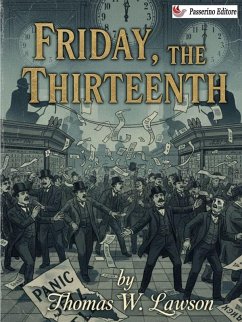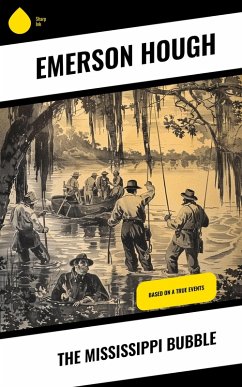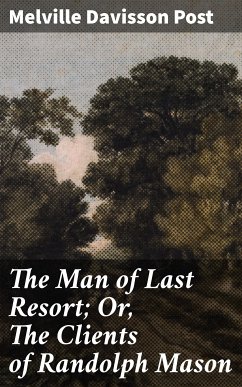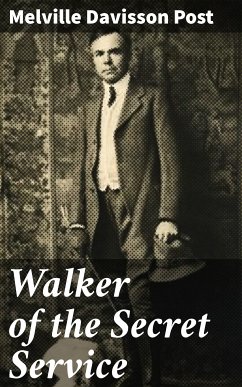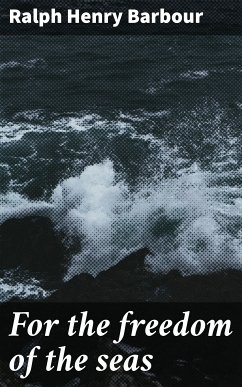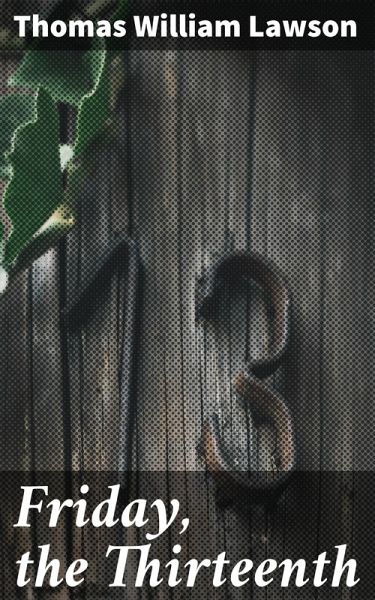
Friday, the Thirteenth (eBook, ePUB)
Enriched edition. A Novel
Kommentar: Day, Sean / Redaktion: Good Press

PAYBACK Punkte
0 °P sammeln!
In 'Friday, the Thirteenth,' Thomas William Lawson weaves a captivating tale that intertwines superstition, fate, and the darker aspects of human nature. Set against the backdrop of a bustling financial district, Lawson employs a rich narrative style that combines elements of social commentary with psychological exploration, revealing how belief in luck can lead to both fortune and folly. The novel's structure cleverly unfolds the eerie implications of the titular day, which Lawrence uses as a vehicle to explore the moral ambiguities of deception, ambition, and the fragility of societal norms,...
In 'Friday, the Thirteenth,' Thomas William Lawson weaves a captivating tale that intertwines superstition, fate, and the darker aspects of human nature. Set against the backdrop of a bustling financial district, Lawson employs a rich narrative style that combines elements of social commentary with psychological exploration, revealing how belief in luck can lead to both fortune and folly. The novel's structure cleverly unfolds the eerie implications of the titular day, which Lawrence uses as a vehicle to explore the moral ambiguities of deception, ambition, and the fragility of societal norms, resonating with the burgeoning themes of modernism that characterized early 20th-century literature. Lawson, an astute observer of human behavior and a successful businessman himself, draws upon his own experiences in the volatile stock market to craft this work. His dual role as both an author and a financial expert provides a unique lens through which he examines the irrational fears and superstitions that can govern people's decisions, ultimately leading to their downfall. Lawson's keen insight into the human psyche, coupled with his literary prowess, offers readers an illuminating discourse on the interplay of chance and choice. This thought-provoking novel is highly recommended for those fascinated by the intersection of superstition and morality, as well as readers seeking a richly layered narrative that challenges conventional wisdom. Lawson's exploration of the unpredictable nature of life serves as a cautionary tale that still resonates in today's unpredictable world, making 'Friday, the Thirteenth' an essential read for enthusiasts of psychological fiction and social critique. In this enriched edition, we have carefully created added value for your reading experience: - A succinct Introduction situates the work's timeless appeal and themes. - The Synopsis outlines the central plot, highlighting key developments without spoiling critical twists. - A detailed Historical Context immerses you in the era's events and influences that shaped the writing. - A thorough Analysis dissects symbols, motifs, and character arcs to unearth underlying meanings. - Reflection questions prompt you to engage personally with the work's messages, connecting them to modern life. - Hand-picked Memorable Quotes shine a spotlight on moments of literary brilliance. - Interactive footnotes clarify unusual references, historical allusions, and archaic phrases for an effortless, more informed read.
Dieser Download kann aus rechtlichen Gründen nur mit Rechnungsadresse in A, B, BG, CY, CZ, D, DK, EW, FIN, F, GR, H, IRL, I, LT, L, LR, M, NL, PL, P, R, S, SLO, SK ausgeliefert werden.





